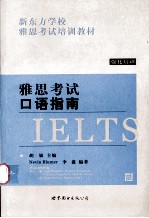

雅思考试口语指南PDF电子书下载
- 电子书积分:13 积分如何计算积分?
- 作 者:胡敏主编
- 出 版 社:北京/西安:世界图书出版公司
- 出版年份:2001
- ISBN:7506249405
- 页数:368 页
The Five Mottos of Successful IELTS Students 1
UNIT ONE Introduction to IELTS Speaking Module 2
Ⅰ.Introduction 2
Ⅱ.Why Prepare for IELTS 3
Ⅲ.Purpose of the IELTS Speaking Section 3
Ⅳ.Main Features of the IELTS Speaking Test 4
Ⅴ.Assessment Standards 8
Ⅵ.Why Some People Score Lower Than They Expect 11
Ⅶ.Why Some People Score Higher Than They Expect 16
Ⅷ.Frequently Asked Questions(FAQ) 19
Ⅸ.How to Self-study 23
Ⅹ.In Summary 25
UNIT TWO Stage 1:Introduction 27
Ⅰ.Interview 27
Ⅱ.Outline of Stage 1 28
Ⅲ.Features of Stage 1 29
Ⅳ.Process 30
Ⅴ.Purpose 30
Ⅵ.Requirements 31
Ⅶ.Strategies 31
Ⅷ.Self-study Strategies 35
Ⅸ.Communication Points and Exercises 36
Ⅹ.Additional Exercises 43
Ⅺ.Answer Keys 53
Ⅻ.Useful Expressions and Exercises 63
ⅩⅢ.Useful Vocabulary 69
ⅩⅣ.Model Questions and Answers 80
UNIT THREE Stage 2:The Long TaIk 104
Ⅰ.Interview 104
Ⅱ.Outline of Stage 2 105
Ⅲ.Features of Stage 2 107
Ⅳ.Process 108
Ⅴ.Purpose 109
Ⅵ.Topics 109
Ⅶ.Requirements 110
Ⅷ.Strategies for stage 2 111
Ⅸ.Self-study Strategies 114
Ⅹ.Communication Points and Exercises 114
Ⅺ.Additional Exercises 125
Ⅻ.Answer Keys 133
ⅩⅢ.Useful Expressions and Exercises 149
ⅩⅣ.Useful Vocabulary 160
ⅩⅤ.Model Verbal Prompt Cards for Practice 167
ⅩⅥ.Model Answers to Cards 203
UNIT FOUR Stage 3:Two-Way Discussion 245
Ⅰ.Interview 245
Ⅱ.Outline of Stage 3 246
Ⅲ.Features of Stage 3 247
Ⅳ.Process 248
Ⅴ.Purpose 249
Ⅵ.Topics 249
Ⅶ.Requirements 249
Ⅷ.Strategies for Stage 3 251
Ⅸ.Self-study Strategies 255
Ⅹ.Communication Points and Exercises 256
Ⅺ.Additional Exercises 264
Ⅻ.Answer Keys 275
ⅩⅢ.Useful Expressions and Exercises 287
ⅩⅣ.Useful Vocabulary 299
ⅩⅤ.Model Questions and Answers 307
UNIT FIVE Practice Interviews 342
Ⅰ.Interview 1 342
Ⅱ.Interview 2 343
Ⅲ.Interview 3 344
Ⅳ.Interview 4 345
Ⅴ.Interview 5 346
Ⅵ.Interview 6 347
Ⅶ.Interview 7 348
UNIT SIX Sample Interviews 350
Ⅰ.Sample Interview 1 351
Ⅱ.Sample Interview 2 357
Ⅲ.Sample Interview 3 363
Conclusion 368
- 《近代旅游指南汇刊二编 16》王强主编 2017
- 《艺考基本功 色彩静物》吴俊芳 2019
- 《甘肃省档案馆指南》甘肃省档案馆编 2018
- 《看视频零基础学英语口语》宋德伟 2019
- 《近代旅游指南汇刊 31》王强主编 2014
- 《设计十六日 国内外美术院校报考攻略》沈海泯著 2018
- 《近代旅游指南汇刊二编 10》王强主编 2017
- 《手工咖啡 咖啡爱好者的完美冲煮指南》(美国)杰茜卡·伊斯托,安德烈亚斯·威尔霍夫 2019
- 《国家执业药师考试历年真题试卷全解 2015-2019 中药学专业知识 1》黄坤主编 2020
- 《近代旅游指南汇刊 13》王强主编 2014
- 《TED说话的力量 世界优秀演讲者的口才秘诀》(坦桑)阿卡什·P.卡里亚著 2019
- 《小手画出大世界 恐龙世界》登亚编绘 2008
- 《近代世界史文献丛编 19》王强主编 2017
- 《课堂上听不到的历史传奇 世界政治军事名人 初中版》顾跃忠等编著 2015
- 《指向核心素养 北京十一学校名师教学设计 英语 七年级 上 配人教版》周志英总主编 2019
- 《365奇趣英语乐园 世界民间故事》爱思得图书国际企业 2018
- 《近代世界史文献丛编 36》王强主编 2017
- 《北京生态环境保护》《北京环境保护丛书》编委会编著 2018
- 《近代世界史文献丛编 11》王强主编 2017
- 《近代世界史文献丛编 18》王强主编 2017
